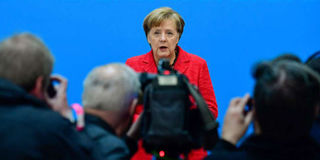Five votes that have rocked international politics

German Chancellor Angela Merkel gives a statement as she arrives for a Christian Democrats party leadership meeting at the party's headquarters in Berlin on March 5, 2018. The social democrats have agreed to join her coalition. PHOTO | JOHN MACDOUGALL | AFP
What you need to know:
- Politicians appeal to the middle and working class.
- The mass entry of refugees into Europe has stirred resentment against ruling parties.
- Political impasse has plagued Germany since the inconclusive elections in September.
PARIS,
The success of the anti-immigrant League party and the anti-establishment Five Star Movement (M5S) in Italy's general election is the latest in a series of blows to the political establishment around the democratic world. Over the past two years voters in the United States, Britain, France, Germany and Austria have all challenged the political status quo.
BREXIT
In June 2016 Britain's voters defied polls and much of the political and media elite in voting by a majority of 52 per cent to quit the European Union.
Populist Nigel Farage led the anti-EU UK Independence Party into the bitter campaign, becoming the face of a movement to "take back control" of Britain's borders and immigration policy.
Conservative Prime Minister David Cameron, who initiated the referendum and campaigned for his country to remain in the bloc, stepped down. He was replaced by Theresa May, who then went on to lose her parliamentary majority in snap elections in June 2017.
Her government remains deeply divided over its Brexit strategy, due to culminate with Britain's departure from the EU on March 29, 2019. Her ministers, as well as those in the opposition Labour Party, are at odds over what level of relationship to maintain with the EU after the divorce.
TRUMP
Despite never having held public office, billionaire Donald Trump won the US election in November 2016 after one of most bitter campaigns in memory.
He defeated Democrat Hillary Clinton and stirred deep divisions within his own Republican party.
Trump's pledge to "Make America Great Again" and restore jobs to middle- and working-class Americans won him support among non-college-educated white voters.
He insulted Hispanics, Muslims and women, promising to protect domestic production against foreign trade and to put national interests over international agreements.
MACRON
In May 2017 pro-EU centrist Emmanuel Macron, then 39, beat far-right rival Marine Le Pen in France's presidential election.
France's parliament underwent a transformation with Macron's En Marche party wresting hundreds of seats from the left and right.
Unknown to the public three years ago, Macron says the En Marche movement which he founded is "neither of the right, nor the left".
His rise ended decades of government by the Socialists and the centre-right party now known as the Republicans.
AUSTRIA
In the April 2016 presidential election the candidates of Austria's two main parties — the centre-left Social Democrats (SPOe) and the conservative People's Party (OeVP) — were eliminated in the first round.
Green candidate Alexander Van der Bellen narrowly won the run-off against Norbert Hofer of the eurosceptic and anti-immigrant Freedom Party (FPOe). He won again when the election was re-run due to procedural irregularities.
The FPOe, one of Europe's most established nationalist parties, was founded in 1956 by former Nazis.
It came third in 2017 legislative elections, and entered the coalition government of the OeVP's Sebastien Kurz.
The FPOe provided six ministers, including the interior, defence and foreign affairs portfolios.
GERMANY
The September 2017 elections were a setback for the two traditional parties — Chancellor Angela Merkel's conservative CDU and the Social Democrats (SPD).
Both sides had been weakened by voter anger about the arrival of more than a million asylum seekers in Germany since 2015.
The far-right party Alternative for Germany (AfD) made a historic entrance to parliament, winning nearly 13 per cent of the vote.
In early March, 2018, the CDU and the SPD renewed their coalition partnership, ending a political impasse that had plagued the country since September's inconclusive election.





